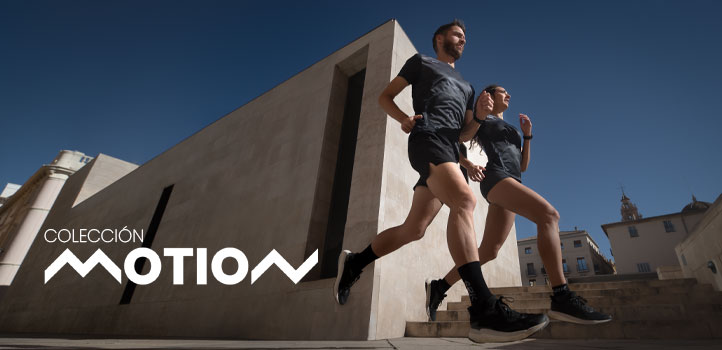Subscribe to our newsletter to find out about all the news and promotions, and automatically receive a welcome discount coupon in your email.
 I think it is a question that all runners have asked ourselves at some time. While many praise it and assure that it is a good way to lose weight and get the coveted "chocolate bar", others say that it can be harmful for our body to make a great effort when it barely has energy reserves.
I think it is a question that all runners have asked ourselves at some time. While many praise it and assure that it is a good way to lose weight and get the coveted "chocolate bar", others say that it can be harmful for our body to make a great effort when it barely has energy reserves.
The following article analyzes what it means to perform physical activity while fasting, its possible risks and benefits, and how to carry it out.
Its author is Sergio peinado -NSCA Certified Personal Trainer (National Strength and Conditioning Association).
By way of introduction we must give a few nuances about the body's metabolism. After spending the whole night without eatinglimentos, we find ourselves before a fasting for about 8-10 hours. This means that we have the low glycogen stores, Unless dinner the night before was rich in low-glycemic carbohydrates.
The body's energy system
El Skeletal muscle is the main tissue responsible for the uptake of glucose in the body, near to 80% of total. During the fast, when insulin levels are low, that muscle uptake by glucose drops to 10%. This occurs because the central nervous system is the glucose consumer par excellence, so the little glucose that there is, has to be for the nervous system. The amount of glucose available is critical for the proper functioning of the brain.
It is of great importance to understand that the type of energy substrate that the body uses depends mainly on the intensity of the exercise. The metabolism gets energy from:
- Phosphagen system (ATP and phosphocreatine): for explosive efforts and of short duration, like a sprint of 50m for a normal staff.
- Carbohydrate reserves: mainly stored in the form of muscle glycogen. Here we have two ways of obtaining energy, when the intensity is very high, and there is not enough oxygen to oxidize the molecules, energy is obtained anaerobically by producing lactate, up to a metabolic point in which acidosis is such that it does not energy can continue to be produced and we cannot continue.
An example would be a 400 meter dash. The other way is aerobic, it is when there is enough oxygen because the intensity is not so high, so that we can be obtaining energy from carbohydrate reserves until they are exhausted. An example would be a longer run of not very high intensity.
- Fat Reserves: which are stored in adipose tissue in the form of triacylglycerides, decomposing into fatty acids to produce energy. You get a lot of energy (in the form of ATP) from fats, the problem is that their molecules have so many carbons that their metabolization is much slower than carbohydrates. Therefore, the body can only get energy from fat during low intensity efforts. An example would be a very slow running trot, or riding the bike smoothly, walking, etc.
Recommendations
 If we go out to make a physical activity as soon as we get up, we must bear in mind that it must be an activity totally light. You must work at a low intensity, because if the few carbohydrate reserves that we have are used, robbing the "food" from the central nervous system, we run a great risk of hypoglycemia and fainting among others. low intensity training the percentage of energy obtained from fat will increase, that is, increases lipolysis and increased oxidation of fatty acids. In addition, during the night there is a greater release of fatty acids into the bloodstream, in this way, if we do physical activity as soon as we get up, we will take advantage of those free fatty acids.
If we go out to make a physical activity as soon as we get up, we must bear in mind that it must be an activity totally light. You must work at a low intensity, because if the few carbohydrate reserves that we have are used, robbing the "food" from the central nervous system, we run a great risk of hypoglycemia and fainting among others. low intensity training the percentage of energy obtained from fat will increase, that is, increases lipolysis and increased oxidation of fatty acids. In addition, during the night there is a greater release of fatty acids into the bloodstream, in this way, if we do physical activity as soon as we get up, we will take advantage of those free fatty acids.
From here we recommend that you take something before running on an empty stomach, a glass of juice and a toast would be enough. Half an hour before. They are about 150 kcal, not too much, but we make sure that the central nervous system does not go "hungry" and we avoid drops in blood glucose. Avoid fatty and protein products, as their digestion is much slower. be very careful with the intensity of the exercise. If the intensity increases, the body will not be able to obtain energy from fatty acids, and must obtain it from the few remaining glycogen stores, which is a commitment to brain nutrition, and a consequent risk.
Also, when there is low carbohydrate stores, Energy production is also obtained from amino acids, through its catabolism for the production of glucose (neoglycogenesis), which is not appropriate if we love our muscles a lot. It is the clear example of the body of marathoners, in which their upper body, muscle mass is totally degraded.
Regarding the duration, it is less irrelevant than the intensity of the exercise. If the intensity is low, such as to be able to obtain substrates mainly from fats, the duration is not such a critical aspect. Even so, the ideal is to perform from about 20 minutes to 30-45 minutes, in a gentle way.
Other considerations
You also have to take into account the rebound effect that it produces, when you finish, you will be much hungrier than normal and it is very easy to fall into excess, not serving the training session at all.
A really important concept is that, to lose weight, you do not have to exclusively lose fat, if not, find yourself in a negative energy balance. This is called the "Theory of energy balance" and postulates that for increase body weight, must eat more calories than are expended, and what for lose body weight, must spending more calories than you eat.
Similarly, for keep in weight, must be eat the same amount of calories you use. Therefore, it does not matter if those calories are obtained from ATP, carbohydrates, or fats, because in the end, it is all about a balance.
The explanation is very simple, you just have to look at an African-American sprinter of 100 meters. They do not run continuously, the maximum they get to run can be about half an hour. That is, when they do physical exertion, they do not get energy from fat. Still, you can see that they have an extremely low body fat percentage. This is because of the aforementioned theory. His workouts are of very high intensity, obtaining energy exclusively through the anaerobic route (ATP, PCr and glycogen).
But this requires so much demand on the body, which in the post-training recovery process, speeds up metabolism a lot, greatly increasing the obtaining energy from fat. This is known as COPD, or excess post-exercise oxygen consumption.
We must think that our ancestors did not have aliment at all times. Surely there were times when they had to make physical efforts while fasting or even malnourished. Despite this, the body dealt with these aspects. Our body is amazing. With this I am not trying to say that running always on an empty stomach is not without risk if it is not done correctly, but rather that our body is not stupid, it knows what we are doing.
The best recommendation, then, is, as always, to test ourselves with caution, and following the aforementioned guidelines, to avoid all kinds of unnecessary risks, to see if it is really effective in our body.
Other entries that they may interest you.
42K · All rights reserved


Comments
Post a first comment for this entry!